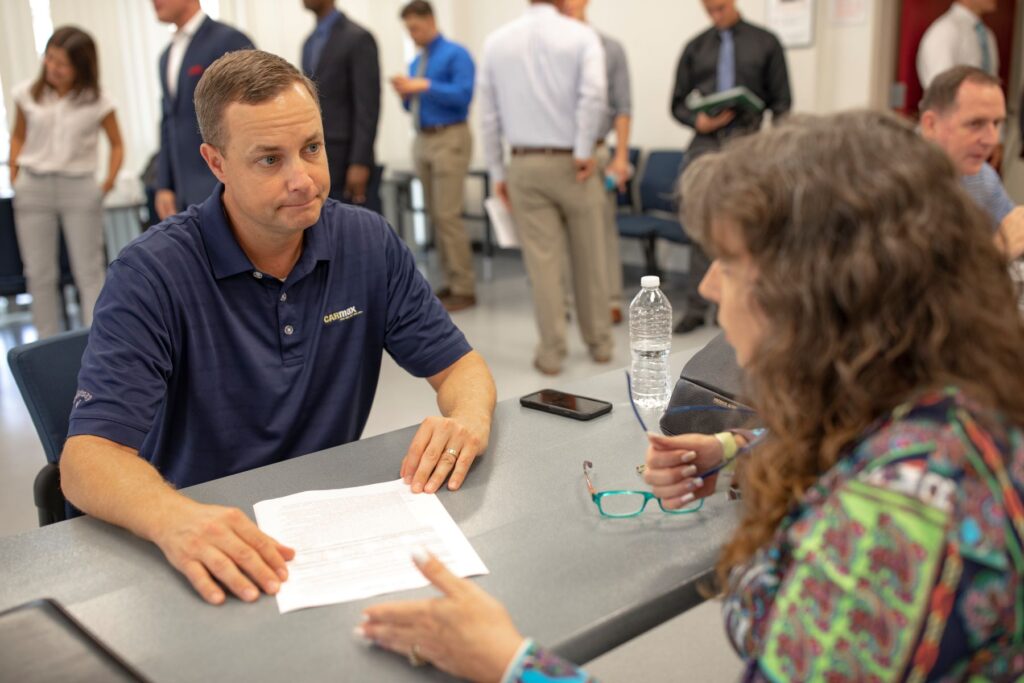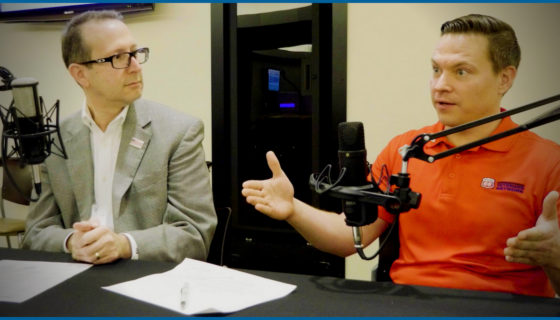The Top 5 Resume Mistakes Military-Connected Job Seekers Make and How to Fix Them

Your resume is your strongest weapon in the battle to stand out among job applicants.
“Your resume supports the belief you are the best person for the position for which you are applying,” said Carla Miller, Deputy Director of the Career Connectors Program at Hiring Our Heroes.
Is your resume highlighting your skills and experiences in the best way possible? Most likely not.
Related: Resume Feedback, Networking Guidance Continue to Ring True Long After Completing Corporate Fellowship Program
Hiring Our Heroes’ Career Connectors reveal the top five resume mistakes military-connected job seekers make and provide tips to avoid making the same mistakes on your resume.
5 Solutions to Fix Common Resume Mistakes

Use Your Most Recent Work History
You may want to include every job you’ve ever had on your resume but resist the temptation.
Career Connectors recommend highlighting your recent work experiences instead of your entire work history.
“Employers want your current experience and knowledge on your resume. There’s no reason to highlight more than 10 years of experience,” Miller said.
Bottom line: Save your entire work history for a job application. Limit your resume to a one-page or two-page document. Your civilian resume should never be longer than two pages.
Add Only Relevant Experience
Our friends at Indeed report employers spend six seconds, on average, scanning through a resume to determine if the person has the right experience for the job opening. Make those seconds count and get hiring managers to spend more time reading your resume by prioritizing your relevant experience to match the job you are applying for.
Are you unsure which work experience to use on your resume? The answer is in the job announcement, said Larissa Rodriguez, a Career Connector at Hiring Our Heroes.
“Review your resume and the job description side by side. Any experience in the job description should mirror your experience or skills and be included in your resume,” Rodriguez said. “Remove any work experience on your resume that you don’t see in the job description. It is not relevant for this job.”
Your qualifications should be obvious to the person reading your resume. Don’t be vague.
“The reality is someone reading your resume will not care how many jobs you have had; they will care about your experience and how it is relevant to the needs of their company,” Rodriguez said.
“The reality is someone reading your resume will not care how many jobs you have had; they will care about your experience and how it is relevant to the needs of their company.”
Larissa Rodriguez, Career Connector at Hiring Our Heroes
Don’t force hiring managers to search your resume for relevant experience. They won’t do it. They will interview someone else.
Bottom line: It’s more important to highlight relevant skills, knowledge, and experience than job descriptions.
Use Keywords
And while we are on the topic of the job announcement, let’s review the importance of keywords in your resume.
Companies use Applicant Tracking Systems (ATS) to electronically screen resumes and applications for keywords and phrases related to the job. ATS software can rank resumes based on keywords. Basically, keywords are the difference between a hiring manager reviewing your resume and your resume being lost and unseen in a digital dark hole.
Career Connectors recommend looking at the job description you’re applying for to find the keywords. Employers often use keywords in a bulleted list of requirements or desired skills for job applicants. The keywords may be certain skills, certifications, or software programs.
Bottom line: Keywords and phrases must be used in your resume but do not overload your resume with them.
Delete Acronyms and Military Jargon
Your resume shouldn’t look like you’re staring into a bowl of alphabet soup.
“If it’s not 100% obvious to the person reading your resume, then ditch the acronym and spell out the word,” said Racheal Tucker, a Career Connector at Hiring Our Heroes.
“If it’s not 100% obvious to the person reading your resume, then ditch the acronym and spell out the word.”
Racheal Tucker, Career Connector at Hiring Our Heroes
Military unit name acronyms and training exercise abbreviations are among the most common ones used by transitioning service members and veterans on their resumes, according to the HOH Career Connectors.
“I always recommend military-connected job seekers ask a non-military friend or family member to read through their resume,” Tucker said. “Or imagine a recruiter with zero military background or experience reading the resume. Are they going to know what 2ID Divarty is? Will they be familiar with 593D ESC CPCE?”
Jargon isn’t only an issue for military veterans. Civilians do it too.
“There will be unique acronyms at every place you’ll ever work. Your new employer will most likely not care about the personalized name of your former employer’s enterprise business intelligence system, so instead, use a general term to describe proprietary systems,” she said.
In conclusion, if your resume reads like this:
- Integrated FEAD priorities to meet the requirements of 72 NAVFAC customers, other divisions in the PWD at NCBVC
- Managed oversight of JLCCTC Federation (WARSIM, IEWTPT, NVIG, MUSE, BE Server, SE Core, OneSAF)
You know what you need to do – JSIO or Just Spell It Out.
Bottom line: If you’re unsure if your resume contains jargon, ask a friend to read it. If they don’t understand a phrase or term, the hiring manager likely won’t understand it either.
Tailor Your Resume to the Job Posting
After you remove the acronyms, add keywords, and include relevant work experience, you may think this one resume is good to use on every job application. Right? Wrong.
Resumes are not one-size-fits-all.
A resume must be revised or tailored before you submit it. This step is key to job search success.
“I compare a job seeker’s resume to the position they are applying for and look for keywords to match the position’s description. I will ask, ‘Where is experience A?’ If a job seeker can’t answer the question, I know the job seeker did not take the time to tailor their resume,” Rodriguez said.
More importantly, the hiring manager knows you didn’t tailor your resume.
“Tailoring a resume is not a waste of time. Rather it shows an employer you took the time to target your resume for the job,” Rodriguez said.
“Tailoring a resume is not a waste of time. Rather it shows an employer you took the time to target your resume for the job.”
Larissa Rodriguez, Career Connector at Hiring Our Heroes
When you are applying for more than one job, tailoring your resume for each job application can be time-consuming. Yet, it’s essential. A tailored resume demonstrates your interest and enthusiasm for a potential employer.
Remember, hiring managers are spending only seconds reviewing each resume. Make those seconds count.
Bottom line: Our friends at Indeed have a step-by-step guide on how to tailor your resume.
We could go on and on about other resume mistakes our Career Connectors see when screening job applicants. (We’re looking at you ChrisFarley1980 email address.) But we won’t.
Armed with these resume tips, we are confident you have the knowledge to identify your mistakes and fix them. Now, go forth and submit your tailored, jargon-free resume.



